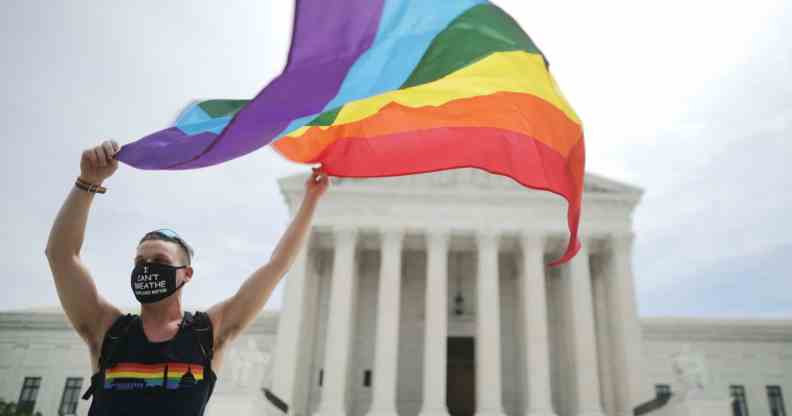US Supreme Court rules in favour of trans woman fighting deportation to Guatemala

A Pride flag flies outside the US Supreme Court. (Getty/ Chip Somodevilla)
The United States Supreme Court has ruled in favour of a trans Guatemalan woman fighting deportation.
On Thursday (11 May), the Justices sided with Estrella Santos-Zacaria, who is seeking refuge in the US – she “fears returning, because she suffered physical harm and faced death threats as a transgender woman who is attracted to men”.
Santos-Zacaria arrived in the US as a teenager but was deported in 2008. She attempted to enter the country again in 2018 but was apprehended by immigration officials.
According to Associated Press, she spent most of her time between 2008 and 2018 in Mexico but decided to try to return to America after she was raped by a Mexican gang.
The 5th US Circuit Court of Appeals rejected her request to remain in the US because her case didn’t meet the requirements to seek asylum, but the Supreme Court has now overturned that ruling.
In the opinion (the court’s official decision), written by Ketanji Brown Jackson, the jurist referred to Santos-Zacaria by her preferred pronouns and name.
The ruling was unanimous, with John Roberts, Brett Kavanaugh, Amy Coney Barrett, Sonia Sotomayor, Elena Kagan, Neil Gorsuch and Samuel Alito filing an opinion concurring with the judgment.
The subtle but important language used was seen as remarkable, especially as the majority of the justices agreed.
Joyce Vance, the first female US attorney, nominated by President Barack Obama, described the inclusive language used as “huge progress”.
The ruling comes as a surprise as most of the Supreme Court judges are conservative, and this decision – concerning a trans immigrant – comes at a time when anti-LGBTQ+ legislation is sweeping the country.
More than 300 anti-LGBTQ+ pieces of legislation have been passed this year alone, with many targeting the transgender community.
Florida’s “Don’t Say Gay” law was expanded to ban teachers from using trans children’s preferred names and pronouns, and the state has also passed a bill that will ban trans people from using public toilets that don’t assign with the gender on their birth certificate.
How did this story make you feel?

